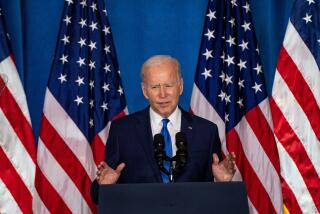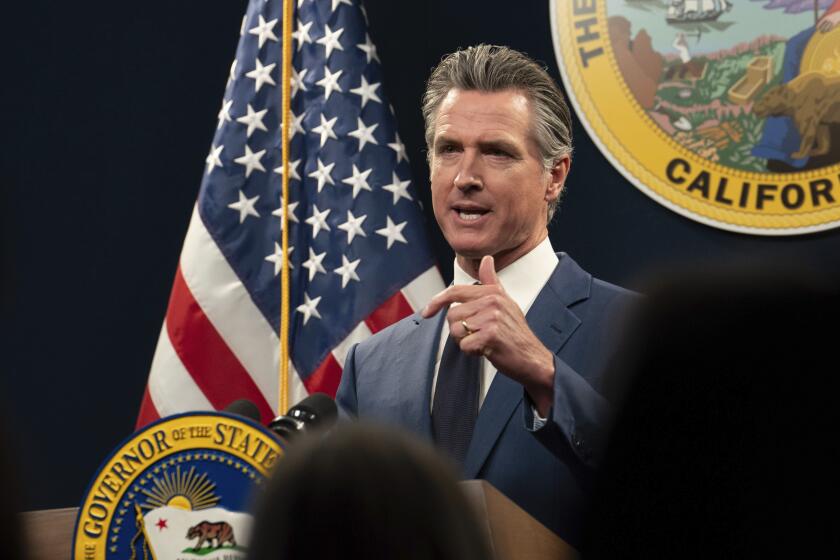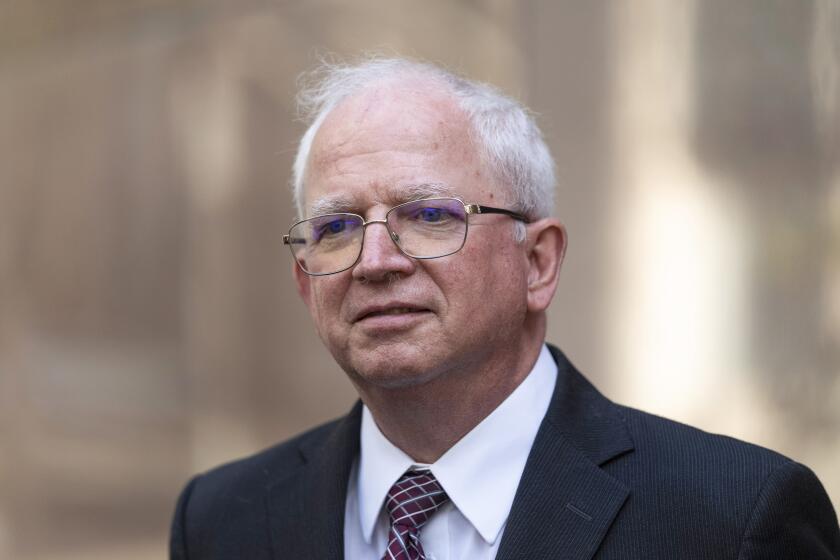House Candidate Given More Time to Press Voting Fraud Charges : Election: Panel dominated panel by GOP sides with Susan Brooks, who is seeking to overturn loss to Democrat Jane Harman in South Bay race.
A House task force dealt a setback to U.S. Rep. Jane Harman (D-Rolling Hills) on Tuesday by giving her 1994 election challenger--Rancho Palos Verdes Councilwoman Susan Brooks--more time to buttress her charges of voting irregularities in November.
The three-member, GOP-dominated task force refused to dismiss the case, even though Harman’s defense team argued that Brooks’ filing was flawed on several procedural grounds. Harman’s victory swung the hotly contested South Bay congressional seat into Democratic hands.
On a 2-1 party-line vote, the panel gave Republican Brooks 10 days to marshal more evidence about allegedly illegal voting practices. The Harman camp will then have 10 days to prepare its response.
On Tuesday, Brooks’ attorney, Robert A. Curtis of Mission Viejo, submitted an inch-thick binder containing nearly 1,500 allegedly questionable votes. Curtis said the additional time will allow Brooks’ supporters to cross-check more voter rolls and bring back even more evidence of suspicious votes.
On Election Night, Harman trailed Brooks but pulled out a 812-vote victory in the 36th District after all the absentee ballots were counted.
Brooks’ supporters say they have uncovered massive voter irregularities and cite examples of “phantom” votes from vacant and commercial buildings, youth hostels, bed and breakfasts, mail drops and at least one Mexican restaurant.
Most of the questionable votes were from the Venice area, Curtis said, a Democratic stronghold. Brooks won 10 of the district’s 13 cities.
If all the questionable votes are eliminated, said El Segundo Mayor Pro Tem Liam Weston, who helped amass the evidence, “Susan Brooks wins by 238 votes.”
Democrats viewed the task force vote as a transparent partisan maneuver that flouted decades of precedent under the Federal Contested Election Act. They said that the law was supposed to help weed out frivolous challenges and that the Brooks case failed to meet the test.
“If we had used bipartisan precedents, this (challenge) would not have been allowed to continue,” House Democratic Caucus Chairman Vic Fazio (D-West Sacramento) said after the vote. “There is no question that this violates all of the criteria.”
But Rep. Bill Thomas (R-Bakersfield), a task force member and chairman of the House Oversight Committee, where the challenge is being heard, said he was more interested in facts than procedure.
“We want to give (Brooks) the best chance possible to make her case,” Thomas said. “We want as much evidence on the table as possible. . . . This is a case of put up or shut up.”
Neither Brooks nor Harman, who sat across the aisle from one another, testified at the hearing.
Afterward, Brooks said “the merits of the case should take precedent over procedural matters.” She said the extra time should allow her supporters to “look at several thousand more names.”
Harman said she was not surprised at the task force decision Tuesday. “This action was not unexpected . . . but I’m confident of the (eventual) outcome. I have no reason to believe that her allegations are true . . . but I’ll be happy to have my ace legal team go over them.
“I’m the duly elected representative of the 36th District--at least until November, ’96. That’s the right time to challenge my being in this Congress.”
Harman’s lawyers contended that Brooks’ case should be thrown out because several procedural requirements were violated. The challenge was filed too late, and Brooks did not exhaust all possible state remedies, they argued.
Originally, Harman attorney David Boies of New York argued, Brooks was contesting only about 400 votes--which was not enough to overcome Harman’s margin of victory. Also, Boies said, there was no evidence that the contested votes were cast for Harman.
Despite sharp partisan questioning, there was little suspense over how the task force would decide the issue. In March another task force allowed a similar election challenge in Connecticut to go forward. Democrats said that in 47 cases since the law’s enactment in 1969, the vote marked the first time that a challenge under the Federal Contested Election Act had not been dismissed.
More to Read
Get the L.A. Times Politics newsletter
Deeply reported insights into legislation, politics and policy from Sacramento, Washington and beyond. In your inbox three times per week.
You may occasionally receive promotional content from the Los Angeles Times.






